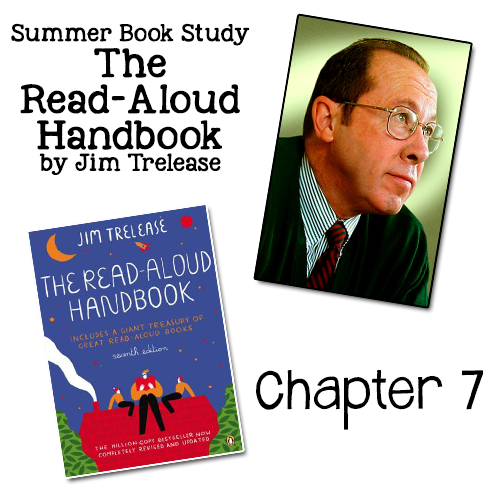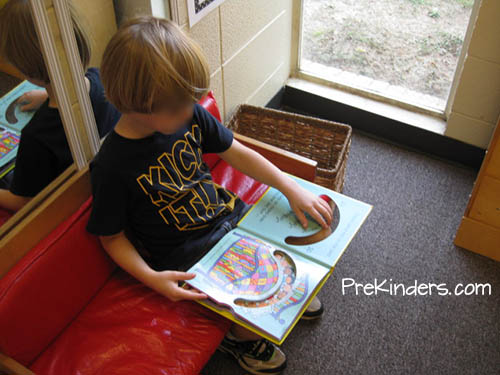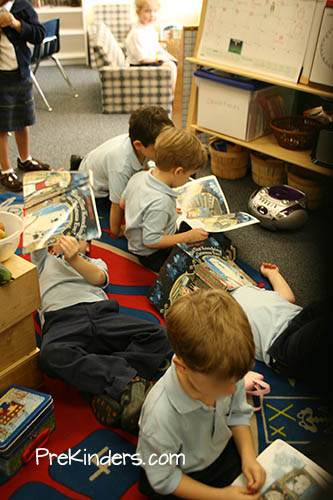
Today I’m hosting Chapter 7 of the Summer Book Study of Jim Trelease’s book The Read Aloud Handbook. Find more details about the book study here with a schedule. Chapter 7 is titled “Digital Learning: Good News and Bad”.
I love technology and I love my gadgets. I believe digital learning has a place in education. However, I also agree with much of what Jim Trelease says about technology not always being a “good” thing. I also read a lot in this chapter that I found very surprising.
For all my love of gadgets, I still have a large personal collection of print books, which I enjoy. I’m reading The Read Aloud Handbook on my iPad, but most of the time, I read books in print. I love to read books and not just the fluff, but to be honest, I don’t read nearly as much as I used to. Since getting “sucked into” the Internet, I find myself on the computer far more than reading books. Now I have to make myself get off the computer and read, and I’m often not successful because of the distractions of the Internet.
I find children are the same way. Turn on a computer, hand a child an iPad, and what happens? Here comes the whole class. Drop the baby doll on the floor, leave the block construction, abandon the paints: the… computer… is… ON! Even though I believe technology has a place in education, I really do prefer a hands-on classroom for Pre-K. I would much, much rather see my prekinders engaged with building blocks or wooden puzzles or designing shapes with pattern blocks than to see them “sucked in” to a computer screen. However, don’t read this and think I’m against tech in education. I’m not. It’s all in the way you use it.

I have had that book Trelease mentioned, The Shallows:What the Internet is Doing to Our Brains, on my to-read list for a while and haven’t gotten around to it (yeah, I’m too distracted by Pinterest and Instagram and email to find time to read it). Anyway, this book says the Internet has “messed with” our brains so that we now read less complex, more shallow reading. We’ve become skimmers rather than reading in depth. Which leads me to wonder: how many of you are skimming my post right now? Are you still reading? Could I save myself some work and just fill the rest of this post with mud pie recipes? 😉
Here’s what I found most surprising in this chapter:
- We read more slowly and comprehend less when we read on screen than on paper. (I did not know that.)
- Studies have shown that digital learning has not helped improve education.
- In one study, 100% of students who took online classes had lower reading scores than public school counterparts.
- Steve Jobs and Bill Gates admitted that computers had made “surprisingly little impact on schools.”
(Well, if computers haven’t made us smarter, they have certainly made things more convenient. Remember the days when we had to trudge uphill both ways in the snow to get to the library for an encyclopedia?)

One of Trelease’s concerns was that our ebooks of today could later be useless just like files on the old floppy disks. I believe that files being useless with time is a thing of yesterday. I believe we will be able to more easily convert old files than we could in the past, but I don’t think we should necessarily consider our e-book purchases permanent. As we delete some ebooks from our e-readers to make more room, or buy new e-readers, I think some books will be lost over time.
I don’t believe e-readers will replace books entirely. I hope they don’t. I believe classroom libraries will still be full of print books for many years to come. With a classroom full of children, it just makes more sense to have a collection of books in print than to have ebooks on a few e-readers. With a print library, all children can read at the same time. If children are more drawn to books that have the covers facing out, I think they will be more drawn to a print book than an e-reader machine.
What were your thoughts on this chapter? Do you tend to skim when you read online? Do you read online or in print or some of both?

